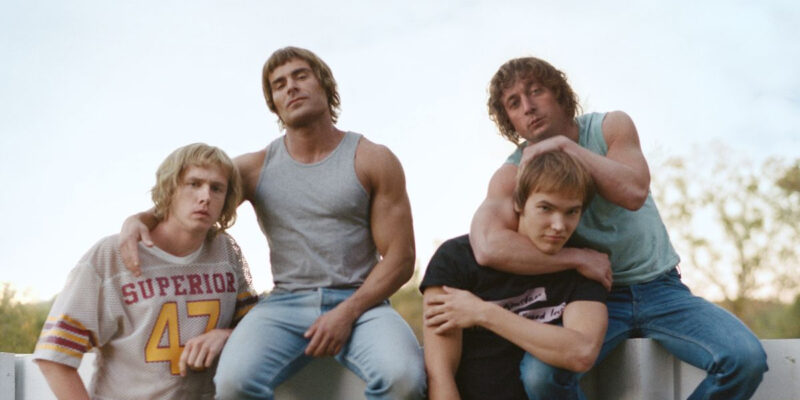There are few families in the world to have suffered the degree of tragedies as the Adkissons, better known by their squared circle performing surname Von Erich.
Jack and Doris Adkisson have had the sad duty of burying five of their sons, none of whom had died of truly natural causes.
Their first son Jack Barton, Jr. died in a freak accident at the age of 6 when he stepped on a trailer tongue that caused him to be electrically shocked and then fell into a puddle of melted snow leading him to die by drowning.
The unusual death of Jack Barton at such a young age perhaps cast a pall over his brothers, even though three had not yet been born at the time of the young boy’s passing.
Yet tragedy would define Texas’ “first family of professional wrestling” and that is the central theme of the biopic The Iron Claw, which centers on the triumphs, trials, and downward spiral of the Von Erich brothers.
The title is a reference to the “finishing maneuver” used by family patriarch Fritz von Erich during his own pro wrestling career that would be utilized by his sons who followed him into the business.
Prior to the national expansion of what was then called the World Wrestling Federation, professional wrestling operated in determined territories. Kind of like the mob.
Old school wrestling fans remember that Louisiana was in the Mid-South territory- which staged matches in Arkansas, Oklahoma, and Mississippi as well and produced big names such as Ted DiBiase, Jake “The Snake” Roberts, “Hacksaw” Jim Duggan, Kamala Harris (though not THAT one), and the king of the NOLA professional wrestling scene The Junkyard Dog.
The Von Erichs didn’t just compete in but literally owned the north Texas territory known as World Class Championship Wrestling, which taped their shows from the now demolished Sportatorium in downtown Dallas.
Like a nepotistic little league coach, Fritz pushed his boys to top billing regardless of merit or even desire.
And here is the central catalyst of the film: a dangerous trying to capture glory for his sons that had eluded him as the villainous Prussian-gimmicked performer never got to be world champion.
In fact Fritz comes of as the one person who seems to believe pro-wrestling is “real” or rather that the title is and comes off as a “mark”.
Cunning and cut-throat, Fritz admittedly plays favorites in the movie and even tiers his sons in terms of fatherly pride as if it were a power ranking.
When Kevin, the oldest surviving son, is shown up by the larger, more charismatic David in terms of potential to attain the “ten pounds of gold” as the National Wrestling Alliance’s title was then colloquially known in the business, Kevin is jettisoned to the side.
Yet the title once again slips from the Von Erich’s grasp as David suddenly died from an intestinal rupture…or heart attack…or drug overdose depending on whom you listen to.
Fritz also pushes the aspiring Olympian Kerry into the wrestling ring and the less athletically gifted Michael, who has little inclination to compete and is habitually embarrassed for storylines.
Compounding matters, Michael is severely injured to the point of almost dying from toxic shock.
Advertisement
Depression over the loss of their older brothers and unrelenting pressure from their father, who proves to be as much of a heel outside the ring as he was inside, combined with drug abuse and addiction pave the way for their respective suicides.
In the case of Kerry, the loss of a foot that he cleverly managed to conceal weighs on him mentally and physically.
Amazingly enough yet another Von Erich brother (Chris) also kills himself but due to the already intense gravitational pull of despair there is no mention of the sickly undersized baby of the family in the movie though elements of his personality are combined with Michael Von Erich’s portrayal.
Though the movie tries to end on a happier note as both Kevin and his mother Doris assert their independence from the domineering Fritz, it’s hard to truly leave the film with anything but a sense of melancholy.
Zac Efron does a decent job portraying a ridiculously sanitized Kevin Von Erich, who his peers claimed was mixed up as much in shady behavior that the movie attributes almost exclusively to his siblings.
If not in actual resemblance, the rest of the cast at least captures the rest of the Von Erich boys in spirit.
And while pro wrestling might be popular with kids, this film is decidedly not for them- depicting numerous scenes of a graphic nature throughout.
The film’s greatest flaw is that it creates an unintended though easily inferred justification for the brothers’ suicide, portrayed as merely a means of escape to attaining a joyous sibling reunion in the next life.
For the impressionable batting depression, The Iron Claw could plant a dangerous seed/message in a troubled mind, rationalizing taking one’s own life. With the deplorable state of mental health in modern society, any attempt in any way to romanticize suicide is best avoided.
The film succeeds at presenting the business as it was, a traveling carnival of athleticism, complete with local fame, groupies, and unfair payoffs.
Yet the movie is not so much about pro wrestling but set with that backdrop; The Iron Claw is a very real tragic story that was worthy of being captured and presented on film.
Advertisement
Advertisement

